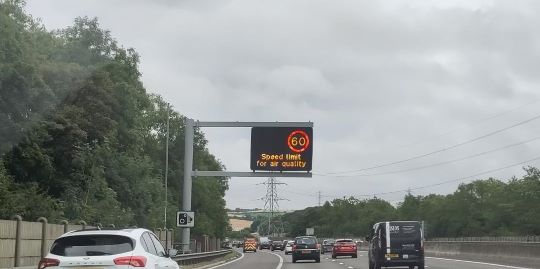
Is our speed causing air pollution?
22 August 2023
Is our speed causing air pollution? And what happens to the air when we drive at speed?
When you drive at speed, you release more harmful chemicals into the air. This is because at speed your car burns more fuel when you drive at high speeds, and fuel combustion releases pollutants such as nitrogen oxides (NOx), sulphur dioxide (SO2), particulate matter (PM), and carbon monoxide (CO).
These air pollutants can have several negative health effects, including:
- Respiratory problems, such as asthma and bronchitis
- Heart disease
- Stroke
- Cancer
- Premature death
In addition to the health risks, driving at speed can also increase the risk of accidents. This is because it takes longer to stop when driving at high speeds, and you are less likely to be able to react to hazards in time.
Speed limit trials in the UK to reduce air pollution
The UK government is currently conducting speed limit trials on some motorways to improve air quality. The trials involve reducing the speed limit from 70 mph to 60 mph and have been in place for two years. The photo accompanying this article was taken recently near Birmingham, UK.
The government believes that reducing the speed limit could help to reduce emissions of nitrogen oxides (NOx) by up to 17%.
The trials are being conducted in areas with poor air quality, such as the M1 near Rotherham and the M6 near Witton. The results of the trials will be used to decide whether to introduce permanent speed reductions on these roads.
National Highways has reported initial findings that managing speed at 60mph has the most significant impact on remissions, reducing them on average by 17%.
This change could potentially bring air quality compliance forward by 1 to 2 years.
The speed limits are currently in trial at the following locations:
- M1 junctions 34 to 33 Rotherham
- M6 junctions 6 to 7 Witton
- M602 junctions 1 to 3 Eccles
- M5 junction 1-2 Oldbury
- M4 Harlington junctions 3 to 4 west bound.
Three locations with poor air quality already had reduced speed limits in place, so did not need new speed restrictions:
- A1 Blaydon Gateshead – permanent 60mph speed limit
- M621 junctions 6 to 7 Leeds – 40mph speed limit for safety during roadworks
- M32 junctions 1 to 3 – 60mph speed limit for road safety
How does National Highways monitor air pollution in its trial?
National Highways is monitoring NO2 in its trial by using diffusion tubes. This is the recognised approach set out by Defra, which is also used by local authorities.
Diffusion tubes are small plastic tubes containing a chemical that absorbs NO2 and are a cost effective way to measure pollution across multiple sites, on and off the network at the same time.
There is also a system of approximately 60 automatic air quality stations, measuring NO2 across the motorway network.
This gives National Highways data on existing air quality and helps to evaluate the impact of new technologies.
Results
The results of the speed restriction trials were due to be published in Spring 2023 however the scale of the data (over 1 billion individual data points) has meant this complex analysis is still taking place.
Therefore, while the full evaluation is taking place the trials are still running to ensure that any benefits to local air quality are not lost in the meantime.
National Highways is currently evaluating:
- whether roadside monitoring shows a reduction in vehicle emissions
- how well road users comply with the signed speed limit
Will the motorway speed limit be raised in the UK?
There have been calls to raise the motorway speed limit from 70mph to 80mph. However, the government has said that it is not currently considering this.
The government believes that raising the speed limit would lead to an increase in emissions and accidents. It also believes that it would be difficult to enforce an 80mph speed limit on all motorways.
The RAC has said that it is not opposed to raising the speed limit, but only if it is accompanied by a large increase in the number of electric vehicles on the roads. Electric vehicles do not emit NOx, so they would help to improve air quality.
RAC head of policy Nicholas Lyes has said: Part of the problem is that at present, there is a high proportion of drivers that break the 70mph limit, and drive nearer to 80mph. If the speed limit were to be changed to 80mph, there is a risk that the new default becomes even higher.
“Our motorways are currently the safest roads on the entire network, and we wouldn’t want to see anything happen to change this. So, unless there is compelling evidence that a change in the limit on some stretches of road would not adversely affect safety, the current limit should be retained.”
Ultimately, the decision of whether to raise the motorway speed limit in the UK is a political one. The government will need to weigh the environmental and safety risks against the economic and convenience benefits.
Speed limits in Europe and beyond
Italy has recently (June 2023) introduced a decree allowing regional speed limit reductions to combat air pollution, it will allow its regions to lower speed limits on highways and motorways passing through or near urban areas struggling with high air pollution.
Other countries are also making similar efforts:
- The Netherlands reduced its daytime highway speed limits from 130 km/h to 100 km/h in 2019.
- France lowered the speed limit in urban areas from 90 km/h to 80 km/h in 2018.
- China has lowered speed limits in many cities, including Beijing and Shanghai.
- India is considering lowering speed limits in some cities, such as Delhi.
A study by the European Environment Agency found that reducing speed limits by 10% could lead to a 7% reduction in NOx emissions.
Top tips for driving economically
As we shift towards electric vehicles, we understand that speed limit trials will at some point no longer be required. However, in the meantime if you don’t have an electric vehicle here are some ways you can drive in an economical manner:
- Accelerate gently and smoothly. Avoid jackrabbit starts and hard braking. When you accelerate, do it gradually and smoothly. This will help you avoid wasting fuel.
- Maintain a steady speed. Don’t drive too fast or too slow. The most fuel-efficient speed for your car will vary depending on the make and model, but it’s generally around 50-60 mph.
- Anticipate traffic. Look ahead and try to anticipate what other drivers are going to do. This will help you avoid braking suddenly, which wastes fuel.
- Use cruise control where possible. Cruise control can help you maintain a steady speed, which is more fuel-efficient than constantly accelerating and braking.
Our technology
We have produced an air purifier for use within the cabin of a vehicle to add another layer of protection for drivers and passengers. Read more about our technology here.
References:
https://highwaysengland.citizenspace.com/he/m5-junction-1-to-2-air-quality-speed-limit/
Latest News
Healthy Air Technology launches HA200 Fresh: A powerful, wall-mounted air purifier for homes and businesses
Healthy Air Technology is proud to announce the launch of the HA200 Fresh, a sleek and powerful wall-mounted…

Integrating Air Purification with HVAC: A Vital Step Towards Net-Zero and Healthier Building
Since the launch of the pilot Standard at the end of 2024, all eyes are on trying to…

Clean Air and ESG: Why Clean Air is Critical to Environmental, Social, and Governance Goals
As Environmental, Social, and Governance (ESG) frameworks continue to shape how businesses operate, one issue stands out as…

